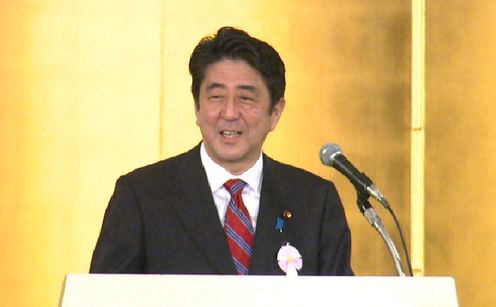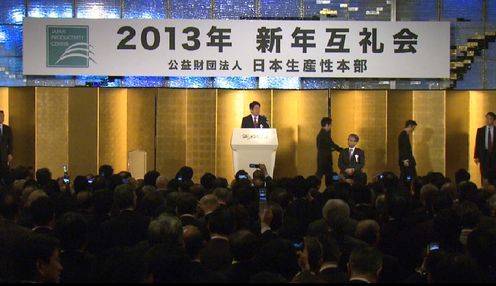Home > News > The Prime Minister in Action > January 2013 > New Year Party by the Japan Productivity Center
New Year Party by the Japan Productivity Center
Wednesday, January 9, 2013

Photograph of the Prime Minister delivering an address at the New Year Party by the Japan Productivity Center 1

Photograph of the Prime Minister delivering an address at the New Year Party by the Japan Productivity Center 2
Prime Minister Shinzo Abe attended the New Year Party by the Japan Productivity Center held in Tokyo.
The Prime Minister said in his address,
"The top prioritized issue, the mission, for the Abe administration is revival of the economy. We have already inaugurated the Headquarters for Japan's Economic Revitalization, and later today we are going to restart the Council on Economic and Fiscal Policy. Further, we will also start the Industrial Competitiveness Council. We will also securely revive the Regulatory Reform Council, which I expect to fulfill its function.
We are using the expression 'three prongs,' namely, bold monetary policy, flexible public finance policy, and a growth strategy that encourages private sector investment, to explain our measures to achieve growth.
We position our fiscal policy by placing top priority on breaking out of deflation, but talking about specific contents, we are definitely not thinking of making wasteful expenditures.
We will make the measures transparent and ask for evaluation by everyone. We will disclose them via the Internet, and try to execute them so that everyone is convinced that the draft budget is a well-put-together budget.
What is important is, in terms of monetary policy, I would like to ask the Bank of Japan as the central bank to take responsibility in achieving the price stability goal of 2%. Naturally, our responsibility is to carry forward the growth strategy.
We are determined to decisively take on challenges. At the same time, under the former administration, I think it is an absolutely necessary condition to establish a stable diplomatic base and security situation, also for achieving economic growth.
In this context, the base of foreign and security policy is the Japan-U.S. alliance, and what supports this base is definitely the relationship of trust.
In order to restore the damaged relationship of trust, although I am trying not to use the word 'in the near future,' I am thinking to hold a Japan-U.S. summit meeting at the earliest possible timing to restore the ties between the two countries, and further reinforce the Japan-U.S. alliance.
Meanwhile, the relationships with Asian countries are also important. By strengthening the relationships and ties with ASEAN countries, or countries with which we share the common values of freedom, democracy and fundamental human rights, such as India and Australia, in terms of security or energy policy, I intend to improve the relationship with China and the Republic of Korea (ROK).
I believe that the key to the growth of the Japanese economy is innovation after all.
As I mentioned earlier, medical technology, elderly care and nursing care in Japan to allow people to live a long life soundly are at the top level in the world.
There is a sufficient possibility that people will come from around the world to receive such services in Japan, and I believe that it is required for us to extend such services to the world.
As for medical devices, although Japan is equipped with the world's best devices for medical examination, Japan is unfortunately not at this point able to manufacture medical devices such as pacemakers.
The causes for this situation are already clear.
If these causes are eliminated, potential still remains for growth for Japan.
By doing so, it is also possible to hold down medical expenditure.
If these devices are manufactured in Japan, the cost will be significantly lower.
Therefore, there is still much potential left, and I believe the same thing can be said in the area of agriculture.
We are willing to take on challenges in every area.
In doing so, what is important for the sustainable growth of the Japanese economy is that we are finally seeing positive signs.
It is important to keep these signs positive. In view of this, I believe it is important that the passage of the supplementary budget is realized at an early stage."

